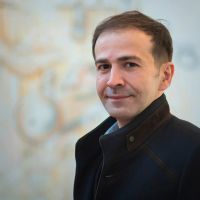Dr. Serdar Turkeli , MSc, PhD
| Assistant Professor / Coordinator Innovation, Institutions & Development Specialisation Research group(s): 3. Economic Complexity and Innovation 5. Innovation and Entrepreneurship for Sustainability Transitions 1. Economics of Knowledge and Innovation 4. Governance and institutions 2. Structural Change and Economic Development Lately, As of 1st May 2024 | Received citations: >1360 | h-index: 15 | i10-index: 18 Serdar Türkeli - Google Scholar
Other:
1st January 2024
RESEARCH: Dr. Serdar Türkeli conducts academic and policy research at the United Nations University - Maastricht Economic and Social Research Institute on Innovation and Technology (UNU-MERIT United Nations University), Maastricht University. He applies quantitative and/or qualitative methods to critical political economy and policy issues related to governance of science, technology and innovation (STI), STI policies and their governance for sustainability, system transitions and societal transformations.
His work has appeared in Journal of Technological Forecasting and Social Change; Journal of Cleaner Production; Journal of Industrial Ecology; Energies; Journal of Sustainability Research; International Economics and Economic Policy; International Economics Letters; Journal Global Policy and Governance; Social Sciences, Journal Circular Economy and Sustainability and as book chapters in Springer, Elsevier and Oxford University Press, and as policy research reports for Scientific and Technological Research Council of Turkey, Turkish Public Enterprises Association, and several European Commission Directorates-General, European Commission Executive Agencies, UN Inter-Agency Task Force on Social and Solidarity Economy, UN Water and UNESCO. TEACHING: Dr. Türkeli holds University Teacher Qualification Certificate (BKO) and Advanced University Teacher Training (TATT) certificates. Dr. Türkeli coordinated "Innovation, Institutions and Development" (IID) and "Social Entrepreneurship and Public Policy" specialisation track of the Master of Science Programme Public Policy and Human Development Holds a broad portfolio of research-led teaching and educational activities. OUTREACH & ENGAGEMENT Dr. Türkeli is Member of the Steering Board of Innovation for Sustainable Development Network: Global Network of Networks (networked spaces for learning), advisor to UNDP SDG AI Lab. Co-founded of Science, Innovation, Technology, Entrepreneurial Engagement for Societal Welfare (SITE4Society) initiative, physical spaces for learning. He engages several levels of knowledge transfer and outreach activities. e.g.:
He performs reviews for journals, publishers and key conferences (e.g. Science and Public Policy, GLOBELICS, APPAM). TECHNOLOGY-ENHANCED RTO INFRASTRUCTURE: In 2017, he established the Lab at UNU-MERIT United Nations University.
Background: Serdar obtained his doctor's degree from Maastricht University, United Nations University; research master of science degree in international studies in computer engineering from University of Duisburg-Essen Germany with an A-level research master’s thesis on international engineering, technology management, and enterprise modelling, and a bachelor's degree in computer engineering from Baskent University (Turkey). Before joining the United Nations University-MERIT, Maastricht University, he worked at Middle East Technical University Science and Technology Policies Research Center (METU-TEKPOL) in several international STI policy research and development initiatives (e.g. EC DG INFSO/Information Communication Technologies; EU COST STRIKE/Higher Education, Foreign Direct Investments; EU FP7/European Research Neighbourhood (ERN); TUBITAK/Machinery and Furniture Clusters; TKIB/Strategy for State-owned Enterprises). He completed PhD-level STI policy studies coursework with an assessment of 91/100. Selected Publications: For selected publications, please see below:
|
|||




